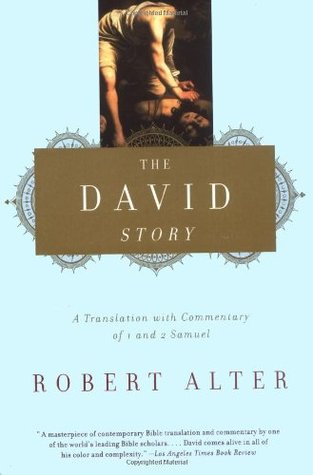As ever, I am late in posting my favourite books of 2014. I won't be settling on an exact Top Ten list, but mentioning a few of the works that have challenged and delighted me this year.
It appears there were 12 books I gave 5 stars to on Goodreads this year, but some of those read last winter seem so far away that I'm going to focus on books I read more recently, even if they had rough edges that merited only 4 star reviews.
Among the most exciting and challenging works was Robert Alter's translation of 1st and 2nd Samuel, titled The David Story. The intrigue and betrayal that characterize the story had fascinated me since childhood, while David's Machiavellianism disturbed me in my most recent reading of the KJV narrative. Alter's comments (or is it sometimes editorial bias?) provoked some great discussions in the class in which I read this. Although I did not read it in full, the Festschrift The Fate of King David: The Past and Present of a Biblical Icon deserves an honourable mention. It contains invaluable essays (and a fascinating play of sorts) that helped me explore and articulate the narrative's ambiguities, especially in relation to Michal and Bathsheba. Its insights showed me again how literary criticism can be an emotional and even spiritual discipline.
Should I Fight? Essays on Conscientious Objection and the Seventh-day Adventist Church (edited by Barry Bussey) occupied my time on numerous Saturday afternoons. The strength and basis of the arguments varied, but overall it helped confirm me in my conviction that radical and socially pro-active non-violence is a position that should be emphasized much more in my own denomination and Christianity at large.
Homer's Odyssey and Margaret Atwood's Penelopiad taught me much about ambiguity, power and voicelessness, western constructions of justice and violence, etc.
Euripide's Medea might just have been the most impressive text, with sections that amount to feminist theory in a work of 431 BCE! Of course, it's also incredibly disturbing, but every character (except maybe the chorus?) has enough ambiguity to invite reflection on perceptions of gender, madness, and power in our own times.
My favourite memoir was Sarah Thebarge's The Invisible Girls, reviewed here; my favourite classic novel was probably Jude the Obscure.
During the first part of the year I diligently counted and recorded how many pages I read a day, but school and work eventually distracted me from my pedantry. (With quite a number of unfinished books, and works that I read sections of for school, my page count is bound to be more than Goodreads acknowledges.) I don't have really specific reading goals this year, except to read several hours a day and stay ahead (or at least caught up) in my reading for school, while still taking as much time as possible to drink deeply of the beauty of words and narratives. When I have a little extra time I hope to explore texts that relate to the ones I'll be reading closely in my academic life, such as (perhaps) Rebecca Goldstein's Plato at the Googleplex after reading The Republic. (Which is what I ought to be doing now. Right now.)
Especially with intimidating texts like The Republic -- but even with the ones I may have a tendency to glide over because they appear easy -- I hope to explore ambiguities and difficulties in short weekly write-ups, as suggested in this interesting book. I may post a few of my "Difficulty Papers" here, but as sometimes my readings and reflections in my honours class lead to existential and spiritual crises, I'll probably keep most of them on a private blog. However, I will try to cross-post a short review of every book read here and at Goodreads so that my reflections don't become a "quick succession of busy nothings".
What I do intend to share on this blog is my Season of Jane Austen. I get the extravagant pleasure of a whole course on The Sovereign Lady this semester, and to consolidate my own research, notes, and ideas I intend to make a weekly Perspectives on Austen or Journal of a Mad Janeite post. Although my time will have constraints, hopefully discussion with my blog followers will also help spark some ideas. I'm making these "promises" here -- my promises are always like ropes of sand -- so you, dear readers, can hold me to the arduous task of blogging more.
 There is no frigate like a book
There is no frigate like a book


No comments:
Post a Comment